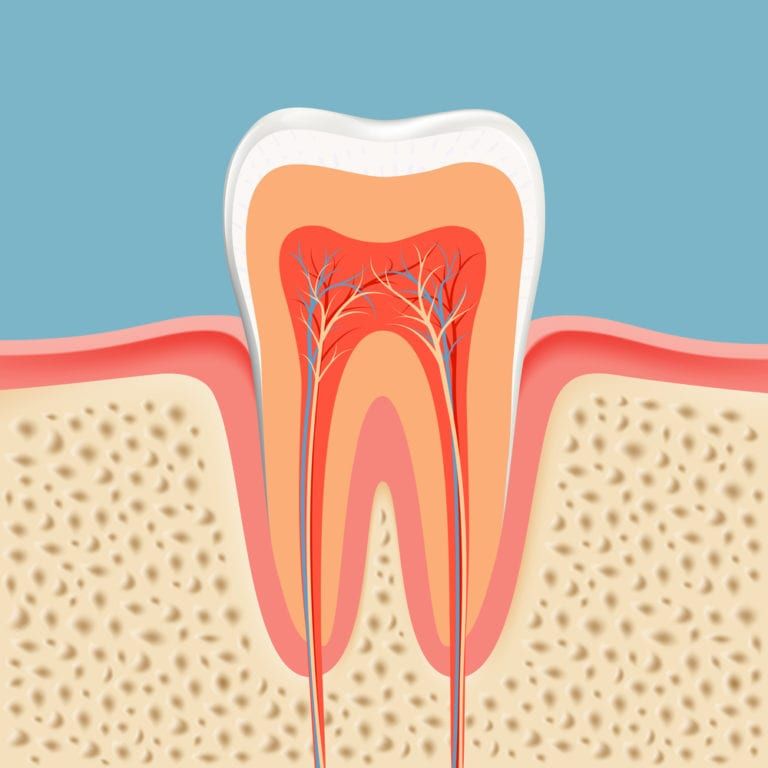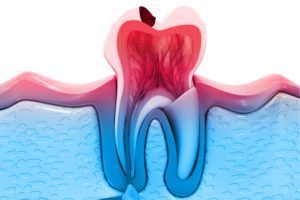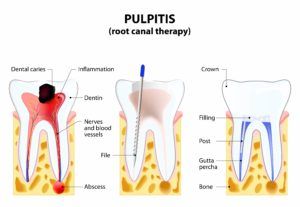Root Canals

Root canals are a necessary dental procedure to save the tooth once the innermost layer has been infected. The innermost layer, also known as the pulp, contains several blood vessels and nerves. When tooth decay reaches the tooth’s pulp, it causes a painful infection. Root canals are dental treatments that work to remove the infected tissue, clean the remaining area, and restore the tooth.
Did You Know?
Root canals have a bad reputation of being painful, however the pain associated with root canals is actually caused by the pain of the infected tooth pulp. Root canals will actually reduce the amount of pain experienced and ensure that the pain and infection do not progress.
Frequently Asked Questions:
Do I need a root canal?

Only a dentist can diagnose a need for a root canal. However, possible symptoms that indicate you could need a root canal include:
- Tooth pain ranging from minimal to extreme
- Tooth discoloration
- Gum swelling or irritation around the affected tooth
- Temperature sensitivity
- If you are unable to bite down with the affected tooth
If you are experiencing any of the aforementioned symptoms, schedule a consultation with Sunset Dental immediately. The longer you wait, the more the infection will continue to spread.
Are there alternatives to root canals?
Unfortunately the only alternative to a root canal is to have the tooth extracted. However, this is not often recommended because it is more invasive and expensive. Once the tooth’s pulp is infected, the only options are to remove the infection and root canals are the safest way to do this.
What causes the tooth’s pulp to become infected?

There are three main layers of a tooth: the outermost layer called the enamel, the middle layer called the dentin, and the innermost layer called the pulp. In most cases, the pulp becomes infected when the bacteria responsible for tooth decay have permeated both the enamel and dentin layer to reach the pulp. Bacteria can also reach the pulp layer through cracks and chips in the tooth. Finally, failed dental restorations can be responsible for bacteria leaking into the pulp.
Are root canals painful?
Root canals themselves are not painful. In fact, during a root canal your mouth will be anesthetized and you should feel nothing. The pain that most people associate with root canals is actually caused by infected pulp chamber.
The pulp chamber of your tooth contains nerve fibers, blood, and lymph tissues. When these structures become infected, the pulp begins to die. The death of the tooth’s pulp triggers an inflammatory response in the body that causes significant pain and inflammation. If anything, root canal treatment actually help to relieve the pain caused by inflammation and infection.
What can I expect when having a root canal?
When having a root canal, you will first be anesthetized to ensure that you are comfortable during the procedure. If desired, you may also receive dental sedation to keep you calm and relaxed. Prior to beginning the treatment, x-rays may be taken to determine the extent of the infection and to check if the surrounding bone has been infected. The affected tooth will then be prepared by placing a rubber dam to isolate it and prevent saliva from entering the treatment area.
Once the tooth has been prepared and the area is numb, a small hole will be drilled into the top of the tooth. This hole is known as an access hole because it allows our dentists to reach the pulp layer. At this point, our dentists will use special root canal files to clean out the pulp chamber and root canals. During the process, both the nerve and the infected tissue will be removed.
The remaining empty pulp chamber and root canals will be flushed out will water or sodium hypochlorite, which acts an antiseptic. Then, the chamber and root canals will be shaped accordingly and prepared for filling. A special dental material called gutta-percha is used to fill the pulp chamber and root canals. Finally, a temporary filling will be placed until another restoration method can be placed.

What can I expect after my root canal?
After your root canal, you may still feel some soreness until the inflammation has completely subsided. This should fade within a few days and can usually be remedied with over the counter pain medications. You will also want to avoid chewing on the side the root canal was performed on until you have the tooth permanently restored. Dental crowns are the dental restoration of choice after a root canal and are usually placed once the tooth has healed from the root canal. Dental crowns are essential because they encase the tooth to protect it from damage or decay.
Once you have received your permanent restoration, you will simply need to practice good oral hygiene practices such as twice daily brushing and daily flossing. Additionally, you will need to visit Sunset Dental at least once every six months for your dental checkups and professional teeth cleanings. Dental checkups are important for your oral health, but they are also necessary to ensure that your restoration is in good condition and to identify any early signs of possible wear requiring repair or replacement.
When is root canal retreatment necessary?
Root canal retreatment is necessary if your tooth becomes infected again. Trauma, tooth decay, and faulty dental restorations can cause a possible infection. In some cases, there may also be narrow or curved root canals that were not thoroughly treated during the initial treatment. However, most root canals have a 95% success rate and teeth treated with root canal therapy can last a lifetime if properly cared for.
To obtain your perfect smile in an anxiety-free environment, schedule a consultation with Dr. Jerry Kronquist and Dr. Amanda Rae Kronquist of Sunset Dental Group today. Sunset Dental Group serves Santa Ana and other central Orange County communities.